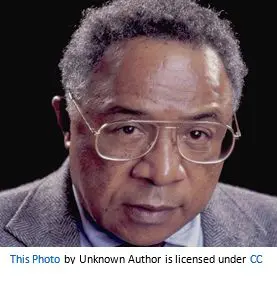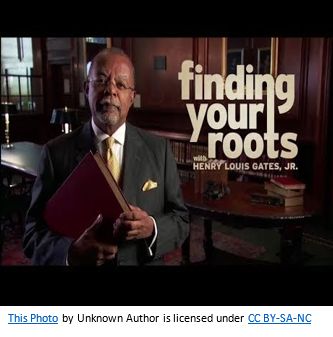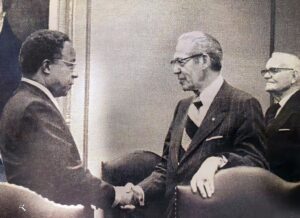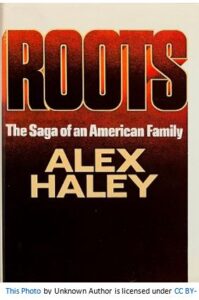Alex Haley

In celebration of Black History Month, we honor Alex Haley, who is considered the catalyst for Popularizing Genealogy in the 20th Century. [i]
Alex Haley set out to write a personal account of his African American family based on their oral traditions. His 1976 tale was a sensation with American audiences. Roots: The Saga of an American Family, won a Pulitzer Price, sold over six million copies, and spent nearly a year on the New York Times best-seller list, much of it at #1. The television mini-series Roots set viewing records when it premiered in 1977, attracting over 100 million Americans to the final episode, reaching 50% of the United States population. A remarkable cast of talented Black actors heightened the sense of realism and authenticity of Haley’s tribute to Black Americans.[ii]
But Haley’s most meaningful legacy was the public passion for family history he ignited. The cultural impact of his book inspired millions of Americans to search for their ancestors.[iii]
What Roots Meant to Dr. Henry Louis Gates Jr.

Henry Louis Gates Jr., the host of Finding Your Roots on PBS, read a Reader’s Digest excerpt of Roots in 1974, and he was mesmerized. After being exposed to Roots, Gates had “a serious bout of envy toward Alex Haley.” He “wanted to be like him: ‘I wanted to reverse the Middle Passage and find out where my ancestors were from in Africa, the motherland,’†said Gates. Alex Haley “called it ‘a hunger, marrow-deep, to know our heritage – to know who we are and where we came from.’ By then, Roots had sold over one million copies in hardcover.”[iv]
“So how would Alex Haley, who died in 1992, feel about the revolutionary DNA technology which helps us identify our origins? He was a good and generous man. He was a profound humanist. He had a lot of light in his eyes. With Roots, [he] followed all the clues as diligently as he could,” starting with stories of an aunt. “He reached his conclusions in good faith. Many scholars have questioned his research since the book was published, but its importance as a phenomenon lay beyond its quote-unquote historical accuracy. The book is a landmark in American history, a signal accomplishment as a profound act of the imagination. Roots continues to be important because we are a nation of immigrants. Even Native Americans came here from somewhere else….”[v]
Gates thinks “it was also the message of Alex Haley’s Roots. “African Americans are immigrants too. We have ancestors with names and birth dates tracing deep into the American past – names and dates that slavery sought to rob – and now the tools exist to help us find them. And through our DNA, we can begin to understand the depth and complexity not only of our African ethnic roots, but of our European and Native American roots as well.”[vi]
Alex Haley presents Johnny Carson his Roots on the Tonight Show
In 1977, Alex Haley became affiliated with the Institute of Family Research, Inc. (IFR), the largest professional genealogical company of the time. Richard Price was one of its researchers. Haley was going on the Tonight Show for an interview with Johnny Carson and asked IFR to prepare a family history for Carson. The researchers worked around the clock for countless hours to compile the history. Haley presented it to Mr. Carson, who was literally moved to tears as he heard the stories of his midwestern, southern and eastern United States ancestors. For those who remember Carson, he rarely showed such emotional reactions on his show. Haley told the audience of the research done by IFR. We subsequently received over 25,000 letters from people interested in finding their roots.

Haley Receives an Honorary Doctorate at Brigham Young University
On August 19, 1977 Alex Haley called on President N. Eldon Tanner and President Marion G. Romney, then counselors in the First Presidency of the Church of Jesus Christ of Latter-day Saints. Brigham Young University, which is affiliated with said church, had “awarded Haley an honorary doctorate” earlier that day. While visiting with these men, “Haley was asked what carried him through his long years of research. ‘The best answer I could give you is faith,’ Haley said. ‘There were times when I would feel that I was going to quit – that the whole thing was foolish, that it was ridiculous.’ He told of an experience that symbolized the most traumatic moments he had while writing the book. He had been working on the section where his ancestor, Kunte Kinte, and others were in the hold of a slave ship crossing the Atlantic Ocean.”[vii]


“Haley said he threw away two batches of 40 pages he had written. ‘It finally struck me what was wrong was what business [had I] sitting up in a high-rise carpeted apartment writing about him in the hold of a slave ship?’ Haley flew to Africa. He booked himself on a freighter sailing to Florida on his return journey. As a retired Coast Guardsman, he arranged to go into the hold where he spent several nights. He forced himself to stay in one position on a plank all night. He listened to the sounds of the ship, felt the cold and saw the darkness and wondered what his ancestor might have heard, felt and seen on his voyage in a slave ship. Each morning, he left the hold and wrote his impressions.”[viii]
“’That went on until the fourth night,’ he said. ‘That night, somehow, I just didn’t want to go back into the hold. It was uncomfortable misery. I went back on the stern of the ship and stood at the rail. I was just standing there, looking at the white trail of froth beating out of the propeller when all of a sudden, all my troubles rolled in on me, just like waves…I’d been 11 years on this book. I had in the world maybe $300 in assets. All of a sudden, I had an experience that I never can forget. I began to hear voices; it was not a big emotional thing but it was, on the contrary, a simple thing. It was like any of us might hear in a dream there were people talking. I heard them say that there was an answer to it; all I had to do was step through the rail and drop into the sea.'”[ix]
“‘I guess I was a millimeter away from stepping through that rail and I heard other voices – nothing sensational – conversational voices saying, ‘No, don’t do that. You must finish. You must go on.’ The voices, he was sure, were those of his ancestors. He tore himself from the rail and, about midnight, went back into the hold of the ship where, he said, he had what was almost like a religious experience. “From that night forward, I never had the misgivings, the tortures of thinking how ridiculous the thing I was trying to do was. But I began to think that perhaps I was some kind of conduit. I felt that my ancestors had considered and approved me and that I was to go on and try to write.’â€[x]
Haley gave advice in this visit. It “would be to interview the oldest people in the family, locate and preserve trunks and boxes and pictures in attics and closets and hold family reunions where information is exchanged.”

Alex Haley died on February 10, 1992. More than 6 million copies of Roots: The Saga of an African American Family have been sold; it has been translated into more than 35 languages.”[xi]
Let us all proceed to capture our roots by learning from other relatives about our forefathers, their challenges and successes in life.
Price Genealogy will be pleased to assist you in finding your roots!
Richard Woodruff Price
[i] National Genealogical Society, August 11, 2021, e-mail message to author.
[ii] Ibid.
[iii] Ibid.
[iv] Gates, Henry Lous Jr. “What Roots Means to Me.†Reader’s Digest, February 2022, pp. 59-61.
[v] Ibid, p. 62.
[vi] Ibid, p. 63.
[vii] Avant, Gerry. 2020. When Alex Haleys ‘Roots’ ignited interest in genealogy. Deseret News: Church News. February 2.
[viii] Ibid.
[ix] Ibid.
[x] Ibid.
[xi] Ibid.
